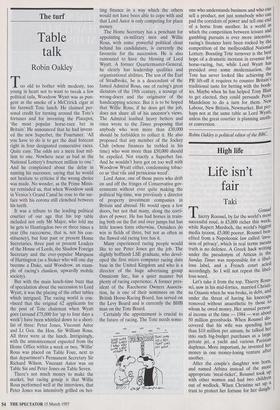The turf
Table talk
Robin Oakley
Too old to bother with modesty, too young in heart not to want to tweak a few political tails, Woodrow Wyatt was as pun- gent as the smoke of a McCririck cigar at his farewell Tote lunch. He claimed per- sonal credit for turning around the Tote's fortunes and for inventing the Placepot, `the most popular horse-race bet in Britain'. He announced that he had invent- ed the new Superbet, the Fourtuner. 'All you have to do is to get the dual forecast right in four designated consecutive races. Quite easy. The odds are a mere four mil- lion to one. Nowhere near as bad as the National Lottery's fourteen million to one.' And he complained about the delay in naming his successor, saying that he would not hesitate to criticise if the wrong choice was made. No wonder, as the Prime Minis- ter reminded us, that when Woodrow sank in Venice's Grand Canal he rose to the sur- face with his corona still clenched between his teeth.
It was a tribute to the leading political courtier of our age that his top table included not only Mr Major, who told me he gets to Huntingdon two or three times a year (the racecourse, that is, not his con- stituency), but four past or present Home Secretaries, three past or present Leaders of the House of Lords, the Shadow Foreign Secretary and the ever-popular Marquess of Hartington (as a Stoker who will one day become a Duke, said Woodrow, an exam- ple of racing's classless, upwardly mobile society).
But with the main lunch-time buzz that of speculation about the succession to Lord Wyatt, it was the placing of the other tables which intrigued. The racing world is con- vinced that the original 62 applicants for the post of Tote chairman when Wyatt goes (around £75,000 for `up to four days a week') have been whittled down to a short- list of three: Peter Jones, Viscount Astor and Lt Gen. the Hon. Sir William Rous. All three were at the lunch. Intriguingly, with the announcement expected from the Home Office within a week or two, 'Willie' Rous was placed on Table Four, next to that department's Permanent Secretary Sir Richard Wilson. Viscount Astor was on Table Six and Peter Jones on Table Seven.
There's not much money to make the market, but racing gossip is that Willie Rous performed well at the interviews, that Peter Jones was intensively grilled on bet- ting finance in a way which the others would not have been able to cope with and that Lord Astor is only competing for place money.
The Home Secretary has a penchant for appointing ex-military men and Willie Rous, with some powerful political clout behind his candidature, is currently the favourite for the succession. He is also rumoured to have the blessing of Lord Wyatt. A former Quartermaster-General, he clearly has leadership qualities and organisational abilities. The son of the Earl of Stradbroke, he is a descendant of the famed Admiral Rous, one of racing's great dictators of the 19th century, a scourge of wrong-doers and the originator of the handicapping science. But it is to be hoped that Willie Rous, if he does get the job, does not share all of his ancestor's views. The Admiral loathed heavy betters and once wrote to the Times proposing that anybody who won more than £30,000 should be forbidden to collect it. He also proposed that any member of the Jockey Club (whose finances he trebled in his time) who won more than £50,000 should be expelled. Not exactly a Superbet fan. And he wouldn't have got on too well with Woodrow Wyatt either, condemning tobac- co as 'that vile and pernicious weed'.
Lord Astor, one of those peers who drift on and off the fringes of Conservative gov- ernments without ever quite making the political big-time, was previously a director of property investment companies in Britain and abroad. He would open a few doors, but not that many, along the corri- dors of power. He has had horses in train- ing both on the flat and over jumps but has little known form otherwise. Outsiders do win in fields of three, but not as often as the flawed old racing lore has it.
Many experienced racing people would like to see Peter Jones get the job. The slightly boffinish LSE graduate, who devel- oped the first micro computer racing data base in the United Kingdom and who is a director of the huge advertising group Omnicom Inc., has a quiet manner but plenty of racing experience. A former pres- ident of the Racehorse Owners Associa- tion, he is one of their nominees on the British Horse-Racing Board, has served on the Levy Board and is currently the BHB man on the Tote Board.
Certainly the appointment is crucial to the future of racing. The Tote needs some- one who understands business and who can sell a product, not just somebody who can pad the corridors of power and tell one end of a horse from another. In a world in which the competition between leisure and gambling pursuits is ever more intensive, racing's finances have been rocked by the competition of the mollycoddled National Lottery. Boosting Tote turnover is the best hope of a dramatic increase in revenue for horse-racing, but, while Lord Wyatt has presided over some modernisation, the Tote has never looked like achieving the PR lift-off it requires to counter Britain's traditional taste for betting with the book- ies. Maybe when he has helped Tony Blair to get elected, they could persuade Peter Mandelson to do a turn for them. New Labour, New Britain, Newmarket. But per- haps not at the same table as Lord Wyatt, unless the great courtier is planning anoth- er conversion.
Robin Oakley is political editor of the BBC.


































































 Previous page
Previous page